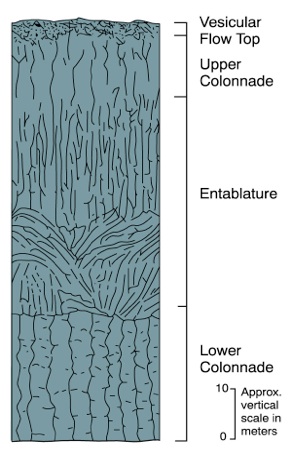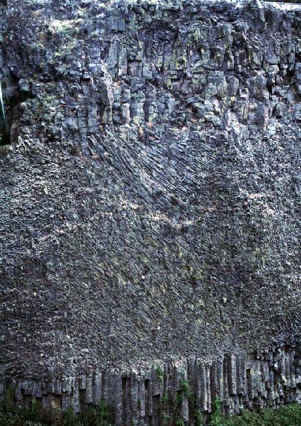Lava flows display a variety of columns, often with a stratigraphic pattern. Colonnade is a coarser, more regular pattern often found at the base of the flow. Entablature is more irregular, and often found near the top. Sometimes there is a sandwich Colonnade-entablature-colonnade structure like this one (Long & Wood, 1986).


Studies of the formation of columns in lavas are also important to the appreciation of the Isle Royale occurrences. The recognition of the role of water infiltration in the formation of certain kinds of entablature jointing (see above) in the Columbia River Flood basalts by Long & Wood, 1986 was an especially important insight (see Iceland examples especially), as was the detailed work on column formation by DeGraff and Aydin (1993) and DeGraff et al. (1989). The work by Goff (1978) provides information on vesicle cylinders in lavas for the Isle Royale occurrences. Green's (1989) paper on the physical volcanology of the North Shore Volcanics gives a valuable comparison with rocks associated closely in time and space with the Isle Royale PLV.
The photo groups that follow show examples of sites around the world where columns have formed as a result of cooling lavas or tuffs. The differences in styles of the joints reflect differing environmental conditions.
Iceland: Basaltic flood basalts with typical columnar joints
Giant’s: Coastal exposure of columnar basalt, at Giant’s Causeway, County Antrim, N Ireland. This is a world heritage site. Age of the lavas is Paleogene (50-60 ma).
Taos: Flood basalts filling the Rio Grande Rift valley, N of Taos NM
Bend: Columbia River Flood basalt flow with entablature/collonade jointing, interpreted as the results of flooding by a river over the top of a cooling flood basalt. Bend, Oregon USA
Banos: Andesite Flow near Tungurahua Volcano, Ecuador: Colonade and Entablature
Yellowstone: Basaltic flows and dikes of the Yellowstone Caldera, Wyoming USA
Caja: Ponded basaltic lava with complex columnar joint patterns, Buckman Road between Santa Fe and the Rio Grande. Rio Grande Rift lavas, N New Mexico.
Boquete: Andesite flow near Boquete, Panama
CoastalPa: Welded tuff of andesitic (?) composition and Tertiary age, exhibiting irregular jointing patterns. Western Panama
Paradise: Columnar jointed andesite from Mt Rainier, Washington, USA.
Toto: Andesite flow near Totonicapan, Western Guatemalan Highlands
Teide: Trachyte lava flows and dikes, Teide Volcano, Canaries, Spain/Africa
Iceland Dike: Thin basaltic dike with perpendicular polygonal joints. S Iceland.
Thera: Mafic dikes and lavas in caldera wall of Santorini, Greece
Tuliere: Mafic intrusions with perpendicular columnar joints, France
Chiricahua: Welded tuffs with large columnar joints, SE Arizona
Bishop: Irregular jointing in Rhyolitic Bishop Tuff, Long Valley, California





